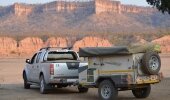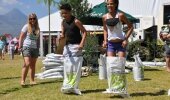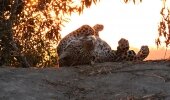Words: Francois Flamengo | Photos: Rudi & Mari-Leana Jacobs & DO IT NOW Media | Video: DO IT NOW Media
In last week’s article (Click here to read), I described our adventure and the many challenges that had to be overcome to get from Johannesburg to Cape Maclear, in Malawi, in time for our boat ride to Mumbo Island.
After two crazy days of travelling, and sheer determination, Elri, Mari, Rudi, and I were happily ensconced on board the boat and enjoying a magnificent sunset cruise on Lake Malawi, with a cold Carlsberg in hand.
The 45-minute boat ride from Cape MaClear to Mumbo Island passed in a blur, as we excitedly chatted about exploring the island and enjoying the many adventures it promised over the next four days. We were like kids in a candy store who couldn’t wait to stick their hands in the sweetie jar.
Mumbo Island is a pristine tropical island in the middle of the expansive waters of Lake Malawi National Park, a Natural World Heritage Site. With a maze of massive underwater boulders, countless species of colourful cichlid fish, and calm, clear water, the National Park offers what many consider to be the best freshwater snorkelling and scuba diving in the world. We were definitely going to put this theory to the test! Mumbo Island is only one kilometre in diameter and has never been populated, so it remains in a natural state. The island is broken up into two sections; the main island area where the restaurant and main activities are located, and the secluded small island that houses five private lodges, each boasting magnificent views of Lake Malawi.
As we arrived, we were warmly welcomed by the island crew from Kayak Africa, and our luggage was whisked away and delivered to our beautiful chalets. Mumbo Island Camp can accommodate up to 14 guests at a time and is perched on high rocks overlooking the lake. The timber, thatch, and canvas chalets, hot bucket showers, eco loos, and hammocks all blend in with the lush foliage and is a wonderful example of how humans can live in harmony with nature. The decor also maintains the 'green' ethos and almost all the furnishings are locally sourced and made either in the village or in Malawi. With no electricity on the island, everything is solar-powered and we learnt to appreciate the crew even more when they had to walk quite a distance every evening to bring us our hot bucket showers.
After settling in, we were shown around by our hostess, Robyn. The sound of a massive, wooden croaking frog, at 19h00 sharp, signalled that dinner was ready. We were treated to a superb three-course meal, and I must add here that breakfast and lunch were also a three-course affair and the crew in the kitchen never failed to impress. By 21h00, we made our way back to our chalets using solar powered torches and lanterns to guide us. Savouring the thought of a solid night’s rest, in a bed, we settled in for the night and were looking forward to what awaited us on our adventure island in the daylight. Coming from Joburg, it was such a liberating feeling to be able to sleep with all the large timber windows and doors wide open without fearing for your life.
Anyone who has heard the cry of a fish eagle will agree that there is nothing quite like it. Imagine our surprise, and delight, when we discovered that the eight pairs that inhabit the island would be our alarm each morning. An exquisite sunrise over Lake Malawi added to the spectacle and with the crew serving us coffee ‘in bed’ each morning at 06h30, there could be no better start to the day, to welcome you to Africa.
Added to this was a pair of very entertaining lizards that made it their mission every morning to bravely challenge us for a rusk crumb or two. The finches, starlings and bul-buls were not as brave, but definitely still interested.
Boasting some 2,000 species, we were eager to explore Lake Malawi’s underwater world on our first day and snorkelling topped our list of activities. What we were especially looking forward to was snorkelling amongst large numbers of the world-renowned cichlid fish species. Thereafter, we would familiarise ourselves with the hiking trails and end off the afternoon chilling on the beach-like lagoon in front of the restaurant.
With our day planned, we kitted up for our snorkelling expedition and headed off to explore the small secluded island that we were staying on, from a different perspective. The water was warm-ish at around 23 degrees, not bad considering it was the middle of winter. Within minutes of entering the water, I was pleasantly surprised by how many different species of fish we saw. There were cichlids everywhere and all in different colours and sizes. Many shined like polished silver, but there were many others like cobalt zebras and Mumbo yellow (only found around Mumbo Island within the National Park), whose names reveal their dazzling colours. The water visibility was a very good eight metres and on some sections it even reached ten metres, making it a delight to explore all the nooks and crevasses that were hidden just below the surface of the water. Some of the bigger rocks resembled dinosaur eggs just lying there, waiting to hatch one day.
We spent over an hour circling the small island and were starting to get a little cold. So we all agreed that it was time to leave our water wonderland and warm up on the beach, with a fresh cocktail, under the hot African sun. With a limited cocktail menu to choose from, we decided to create our own from what was available from the bar and called it a Mumbo Mojo, which consisted of fizzy pineapple soda, soda water, and Malibu Rum. Delicious!
After such an amazing snorkelling session we were keen to do some diving, so we contacted the mainland to book cylinders and other diving gear, which would arrive the next morning on the 09h00 boat. Rob, our diving instructor who lived on the mainland, would also join us the next morning to lead the dives for us. With the arrangements made and our tummies full of delicious grub, it was time to lay low for a few hours on the hammocks in front of our lodges. Hammocks, the warm afternoon sun, and a slightly chilly wind that had picked up were just the right mix of nature’s elements to take us to never-never land for the next two hours.
With little time left before the sun slipped below the horizon, we decided to do the Ring Route hiking trail on the southern side of the island and check out some of the areas marked on the map. The route started with a gentle climb past the Bush Lapa, where visitors could book relaxing massages. The route was well marked and we reached Fisherman's Camp, where local fishermen set up camp at night, after about 10 minutes of hiking through the forest. The camp was nestled in a beautiful bay and sparkling blue water gently lapped up against the shore. We continued on towards Impipi Beach, another fantastic lookout area and from where you can see a few more islands on the horizon, as well as Senga Bay on the other side of the mainland.
It was starting to get dark so we returned to camp, where we were once again lured in by our croaking friend for another delicious, local meal. After dinner, we played some board and card games in the open lounge area, including a traditional Malawi board game called Bao.
This game is played on a board with four rows of seed pockets, and each pocket has two seeds in them when you start. The objective is to get all your opponents seeds out of the inner row, thus leaving them without any moves. It was great fun and we decided that a smaller version of this game would make a great memento of our time spent in Malawi.
Rob arrived on the first boat the next morning, and after a quick briefing on the sites we would be diving, we kitted up and loaded our gear into the boat. Our first dive site was called Tooth Rock. It was a pinnacle that just breached the water in the shape of a tooth, hence its name. Rob told us that it goes down to 70 metres and that we should keep a weary eye on our depth gauges during the dive.
The rock formations below the surface were incredible, with many swim-through areas keeping us entertained. Some of the caves were quite intimidating because of the limited equipment we had with us, so we decided to play it safe and not enter them. The water visibility also diminished in some areas and only reached about six metres. Once again surrounded by millions of cichlid, it felt like we were diving in a gigantic fish tank. At the end of this dive, we spotted a massive giant lake eel that was about one-and-a-half metres long. This was very exciting because it was a rare sighting and to see it on our first dive was really special.
We did two more awesome dives, one around Mumbo Island (shore entry) and the other in Impipi Bay. The Mumbo Island dive had the most amazing massive boulders, so the topography of the dive was quite different from that of our first dive. The great thing about all these dives is that they are super relaxing and not intimidating at all. I was happy to add them to my dive log and can’t wait to add a few more on a return visit to Lake Malawi.
During our stay, we also explored both islands on double kayaks, and one of our more memorable moments happened when we encountered one of the two species of harmless snakes on the island. Let's just say that not everyone in the group will think back on this with fondness J.
On our final evening we took a sundowner cruise to the middle of the lake, where we had the sudden urge to be a part of this magnificent, mirror-flat lake one last time before our departure, so we decided to jump in. Back on the boat and in the stillness of the night, we reflected on the superb few days we’d had on Mumbo Island. The snorkelling, kayaking, bird watching, scuba diving, hiking, RnR moments in the hammock, and chilling on the beach really recharged the soul. Although we were sad to leave the next morning, we were in agreement that it would not be a ‘final goodbye’, but rather ‘until next time’.
Mumbo Island is adventurous, rejuvenating, and like a magical scene from a fairy tale. So if you are looking for an escape from the fast lane, be sure to consider Malawi and Mumbo Island and be prepared to be blown away by its beauty!
dinFO:
Mumbo Island - www.mumboisland.com
Kayak Africa Reservations - email: , website: www.kayakafrica.co.za
Bao board game: http://en.wikipedia.org/wiki/Bao (mancala_game)





